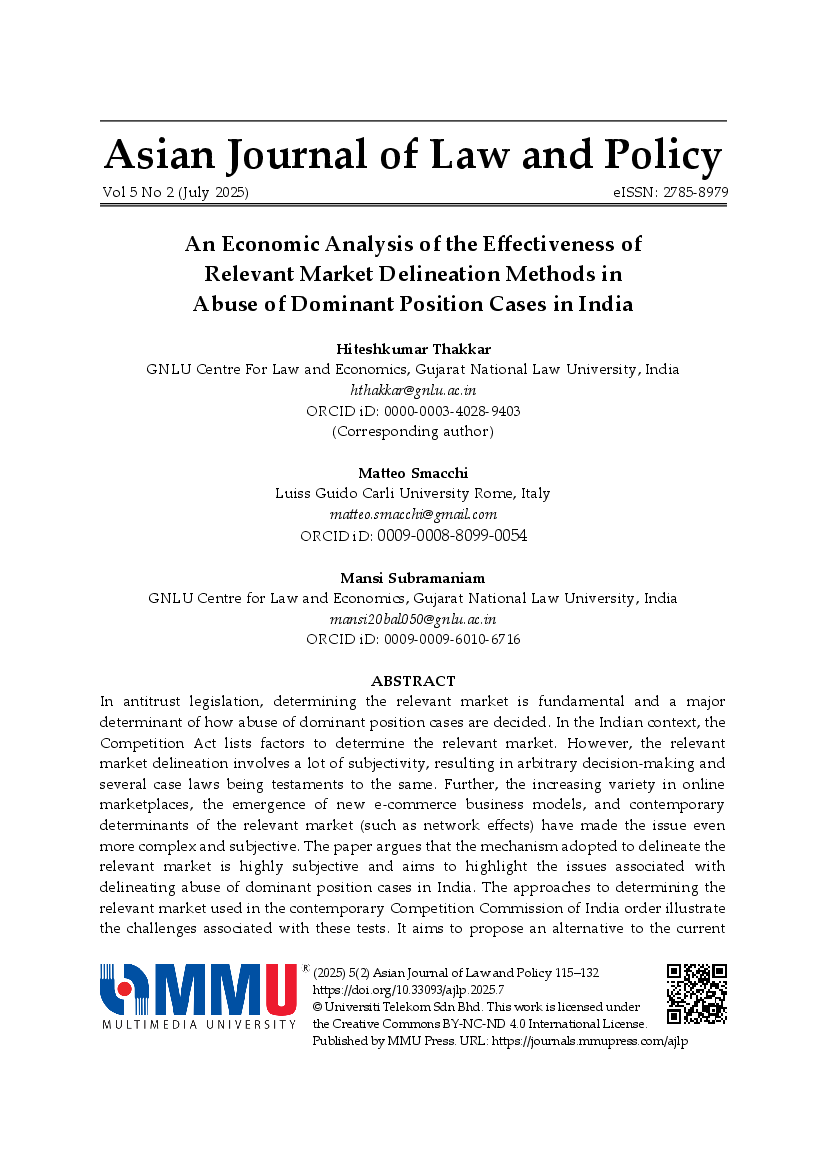An Economic Analysis of the Effectiveness of Relevant Market Delineation Methods in Abuse of Dominant Position Cases in India
Main Article Content
Abstract
In antitrust legislation, determining the relevant market is fundamental and a major determinant of how abuse of dominant position cases are decided. In the Indian context, the Competition Act lists factors to determine the relevant market. However, the relevant market delineation involves a lot of subjectivity, resulting in arbitrary decision-making and several case laws being testaments to the same. Further, the increasing variety in online marketplaces, the emergence of new e-commerce business models, and contemporary determinants of the relevant market (such as network effects) have made the issue even more complex and subjective. The paper argues that the mechanism adopted to delineate the relevant market is highly subjective and aims to highlight the issues associated with delineating abuse of dominant position cases in India. The approaches to determining the relevant market used in the contemporary Competition Commission of India order illustrate the challenges associated with these tests. It aims to propose an alternative to the current approaches, to reduce the arbitrariness and disparity in the adjudication of similar matters. The paper seeks to address whether the current method(s) of identifying the relevant market in abuse of dominant position cases are effective.
Article Details

This work is licensed under a Creative Commons Attribution-NonCommercial-NoDerivatives 4.0 International License.
References
Amelia Fletcher, 'Revisiting the Hypothetical Monopolist Test, and the Role of Common Sense Market Definitions' (Pros and Cons Conference 2017, Centre for Competition Policy, 3 November 2017) <https://www.konkurrensverket.se/globalassets/dokument/engelska-dokument/knowledge-and-research/the-pros-and-cons/2017_4---amelia-fletcher.pdf>
Commission Notice: 'On the Definition of Relevant Market for the Purposes of Community Competition Law‘ (EUR-Lex, 9 December 1997) <https://eur-lex.europa.eu/legal-content/EN/TXT/?uri=oj:JOC_1997_372_R_0005_01> (1997) Official Journal of the European Communities
Cyril Shroff and Avaantika Kakkar, “India: Abuse of Dominance” (Global Competition Review, 19 March 2019) <https://globalcompetitionreview.com/review/the-asia-pacific-antitrust-review/2019/article/india-abuse-of-dominance>
Gregory J Werden, “Why (Ever) Define Markets? An Answer to Professor Kaplow” (2012) 78(3) Antitrust Law Journal 729–746 Social Science Research Network Electronic Journal <http://dx.doi.org/10.2139/ssrn.2004655>
Kaushal Kaushal Sharma, 'SSNIP Test: A Useful Tool, Not A Panacea' (Competition Law Report 2011)
Louis Kaplow, ‘Why (Ever) Define Markets?’ (2010) 124 (2) Harvard Law Review 437–517
Morris A Adelman, “Economic Aspects of the Bethlehem Opinion” (1959) 45 Virginia Law Review 684 <https://doi.org/10.2307/1070847>
Richard S Markovits, Economics and the Interpretation and Application of U.S. and E.U. Antitrust Law: Volume I Basic Concepts and Economics-Based Legal Analyses of Oligopolistic and Predatory Conduct (Springer 2014)
RL Koul and Priya Prasad, “An Analysis of the Abuse of Dominant Position by the E--Commerce Retailers in India” <https://www.scribd.com/document/478524160/8ae1Article-IX-Page-55-61>
Rupprecht Podszun, “The Arbitrariness of Market Definition and an Evolutionary Concept of Markets” (2016) 61 The Antitrust Bulletin 121 <https://doi.org/10.1177/0003603X15625109>
Stephan M Levy, 'Are Relevant Markets Ever Irrelevant?' (HMG Review Project – Comment, Project No P092900 2009) <https://www.ftc.gov/sites/default/files/documents/public_comments/horizontal-merger-guidelines-review-project-545095-00020/545095-00020.pdf>
Sudhanshu Kumar and Sumer M Dugar, Guide to Competition Act, 2002: An Exhaustive Section-Wise Commentary Incorporating All Legislative and Judicial Developments (8th edn, LexisNexis Butterworth India 2020)
Sumer M Duggar, Guide to Competition Law, vol 1 (7th edn, LexisNexis 2017)
Surinder Singh Barmi v The Board of Control for Cricket in India, (Case No. 61/ of 2010) (Competition Commission of India, 8 February 2013)

